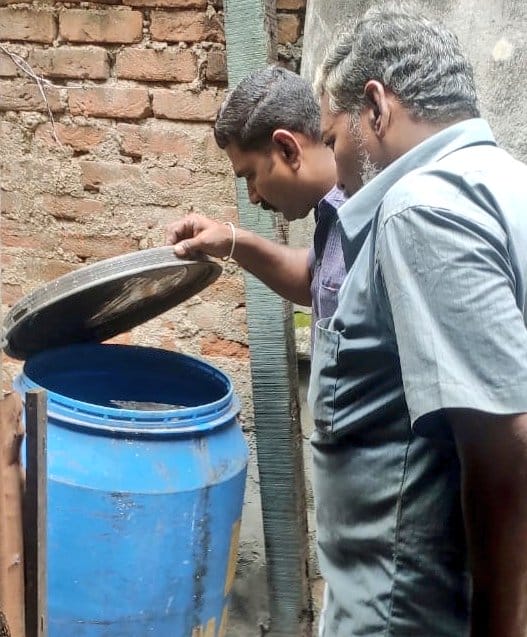Every time the rainy season brings its share of thundershowers and gusty winds, Roshni Pillai, a resident of Thiruvanmiyur is wary of taking her three-year-old out of the house. Last year, the little girl caught a respiratory infection during the monsoons, which took a while to resolve. “Children are vulnerable to seasonal infections, especially during the monsoons and we are being careful so that the severe cough and runny nose do not come back,” says Roshni.
With the onset of the rainy season, diseases tend to surge, creating health concerns for residents. Meanwhile, Chennai’s public health system is also gearing up for its annual challenge — monsoon-related illnesses.
Read more: Staying safe while driving on Chennai roads this monsoon
Common infections during monsoons in Chennai
“During the heavy rains and floods in Chennai, waterborne diseases such as diarrhoea, gastroenteritis, typhoid and cholera, and vector-borne diseases become prevalent. There is also an increase in viral infections with flu-like symptoms. Food-poisoning cases surge during the monsoon and these shouldn’t be taken lightly as without timely treatment, some of the symptoms can be life-threatening,” says Dr Priya Shankar, a city-based general practitioner.
Dr Priya lists some of the rain-related infections common in Chennai during the monsoons:
- Vector-borne diseases: Mosquitoes thrive in waterlogged areas throughout the city, bringing diseases including dengue, malaria and encephalitis.
- Skin infections: These often occur as a result of prolonged exposure to damp and inundated conditions. Fungal infections such as ringworm and athlete’s foot thrive in moist environments.
- Respiratory ailments: Allergies, asthma and bronchitis tend to proliferate due to the humid air and mould growth in damp environments, both indoors and outdoors.
- Gastrointestinal problems: These include food poisoning, stomach infections and irritable bowel syndrome, which can be aggravated by contaminated water and food.
- Flu and viral fever: Spread easily in crowded or damp environments, often leading to widespread outbreaks during the monsoon.
- Diarrhoea: This may be caused by waterborne pathogens due to inadequate sanitation and the mixing of rainwater with sewage.
- Conjunctivitis: Also known as Madras eye, this infection becomes increasingly common during the monsoon season.

Precautions for Chennai residents during monsoon
Here are some preventive measures for residents to stay healthy and safe during the rainy season in Chennai:
Avoid stagnant water: Stagnant water serves as a breeding ground for disease-carrying mosquitoes. Residents must eliminate sources of stagnant water and avoid wading through contaminated water to prevent diseases.
Use mosquito nets and repellents: Protect against mosquito-borne diseases by using nets while sleeping and applying repellents.
Maintain personal hygiene: Frequent hand washing and personal hygiene practices help prevent the spread of infections. It’s essential to keep the skin dry and avoid wearing wet clothes for extended periods to prevent infections. Proper hygiene and frequent changing of clothes can reduce the risk of skin issues during the monsoon.
Consume safe drinking water: Ensure both children and adults drink boiled and cooled/purified water to avoid water-borne diseases.
Stay hydrated: Drink adequate amounts of liquids to stay hydrated, especially in humid conditions.
Eat fresh and cooked food: Consume freshly prepared and thoroughly cooked food to minimise the risk of food-borne infections.
Include immunity-boosting food in your diet: Fruits and vegetables rich in vitamins and antioxidants help boost immunity, providing additional protection against diseases.
Avoid uncooked and stale food: Steer clear of stale or leftover food, as it can lead to food poisoning. Also avoid uncooked food from outside.
Adhere to COVID-19 precautions: Continued adherence to COVID-19 precautions is crucial to prevent a rise in infections. The Health and Family Welfare department in the city emphasises the importance of maintaining these precautions to curb the spread of diseases such as wearing masks, washing hands and social distancing. Adhering to these COVID-19 precautions alongside monsoon-specific measures is crucial for maintaining public health and preventing a surge in infections.
Read more: Lessons for Chennai from the rainy days of the southwest monsoon
GCC’s monsoon healthcare initiatives in Chennai
The Greater Chennai Corporation (GCC) is implementing a healthcare strategy to identify, address, and contain these diseases, placing a strong emphasis on disease surveillance. They organise interim medical camps, need-based check-ups and consistent health surveillance in every ward in Chennai.

Shankar Lal Kumawat, Additional Commissioner at the health department of GCC says, “We continue to operate medical camps and expand them as necessary, often running 30-35 camps per day. Additionally, we maintain a ready supply of essential drugs at the camps and have a fully-prepared medical team in place, ensuring readiness for any monsoon-related emergencies. Mobile medical camps are also employed to reach more areas effectively.”
The GCC also focuses on data-driven surveillance. Soundararaj, Superintendent of the Directorate of Epidemiology, says, “The data is sent to the state-run Integrated Surveillance System, where the database of outbreaks is stored and this aids in combating monsoon-related illnesses effectively.”
